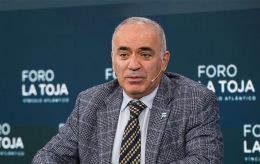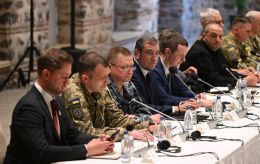EU to increase military power and aid to Ukraine because of Putin and Trump - Bloomberg
 Photo: EU to revive military power (Getty Images)
Photo: EU to revive military power (Getty Images)
European officials are working on a major new package of measures to increase defense spending and support Kyiv. However, the spending plans will not be announced until after the Feb. 23 German election to avoid stoking controversy before the vote, Bloomberg reports.
Several EU leaders have been invited to Paris on February 17 to begin drafting their response after US officials made clear that there is a limit to what the United States is willing to do.
European leaders have been tasked with reviving the continent's military power after nearly 80 years of effectively outsourcing much of its security to the United States.
Donald Trump's return to the White House has fundamentally changed transatlantic relations, and US officials have made clear that the president is ready to abandon allies if they refuse to take responsibility for their security.
“The overall consensus was that the United States was no longer going to foot the bill for NATO security,” said Republican Congressman Michael McCaul in an interview, reflecting on the discussions at the Munich Security Conference.
According to Bloomberg, the situation is becoming urgent as Trump rushes to end the war in Ukraine and European officials worry that President Volodymyr Zelenskyy could be pushed into a disastrous deal if they do not quickly develop a plan to provide him with military support.
The Trump administration has told European officials that it wants a ceasefire in Ukraine by Easter, sources told Bloomberg. Some officials said the pace of the talks, which begin this week in Saudi Arabia with senior US and Russian officials, is ambitious and potentially unrealistic.
Trump launched his peace initiative with a call to Vladimir Putin last week and shocked European officials when US Defense Secretary Pete Hegseth said that Europe would be responsible for the security guarantees and peacekeeping troops that would be needed to guarantee Ukraine's security after a deal is concluded.
The US strategy risks playing into Putin's hands, as Trump gave up significant leverage before the talks even began.
Summit in Paris
Macron will host his counterparts from Germany, the UK, Italy, Poland, Spain, the Netherlands, and Denmark, as well as NATO Secretary General Mark Rutte. The talks will focus on Ukraine and what security guarantees European countries could agree on immediately so that Europe is not left out of Trump's negotiations, according to a source briefed on the preparations.
In Munich, Rutte said that the European proposal would focus on military training, accelerating aid, arms supplies, and what Europe could offer as security guarantees.
“We will launch a large package that has never been seen in this dimension before,” German Foreign Minister Annalena Baerbock said in an interview on the sidelines of the Munich meeting. "Similar to the euro or the corona crisis, there is now a financial package for security in Europe. That will come in the near future.”
Peacekeeping troops and money
Officials in France and the United Kingdom also expect to discuss the extent to which leaders are willing to notify the United States of their willingness to send peacekeeping troops to Ukraine as part of the deal. Such a proposal would likely be part of a European security guarantee offer, even if some countries are reluctant to do so, and would be a great leverage point with the US, one of them said.
A potential source of funding could be frozen Russian assets worth $300 billion, which are mostly stored in many European countries.
The seizure of these assets was a central topic of discussion in Munich, where US officials made it clear to their European counterparts that Congress would not approve any additional aid packages for Ukraine.
Over the three years of Russia's war against Ukraine, Western countries have provided Ukraine with a small but steady support of about 80 billion euros a year.
The amount of aid is relatively small if measured as a share of the donor country's GDP. For example, Germany, the United Kingdom, and the United States mobilized less than 0.2% of their GDP per year to support Ukraine, while other rich donor countries, such as France, Italy, and Spain, allocated only about 0.1% of their annual GDP.

